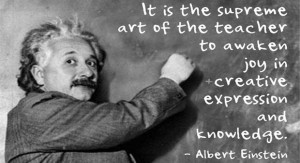What I learnt from saying ‘I don’t know’ , ‘I got that wrong, let’s start again’.
There is such an expectation that as the teacher we should either know the answer, or where to get it – as if we are a walking Wikipedia. The need to know shapes how we talk with kids and how we present our vulnerability in the class until we get to the point where maybe we don’t show our real selves, but an armoured up version that doesn’t want to admit mistakes or be wrong.
I have seen classes where the teacher puts themselves under such pressure to perform perfectly that this spills over onto the kids. I watched one class crumble when their regular -perfectly poised – control-freak teacher left on maternity leave. The kids went wild, and their replacement teacher was not going to stand a chance with them until they had all acknowledged the consequence of the repression that perfectionism causes.
What can we do as directors?
I would encourage school directors to talk about failure and celebrate it as a moment of self reflection and learning for your team. Allow failure to become acceptable and seen as a positive part of the process in your school. Encourage your team to try new things,and to talk about what went wrong (as well as what went well) – share the learning so that vocabulary around failure becomes acceptable and more common place in the team. Take the pressure out of performance, and start talking about the process and not results, and give space for the process to unfold in its own time, rather than expecting instant results.
What can we do as teachers?
I would encourage you to move your table to the side or the back of the room – take yourself out of the position of control and all knowing. Discuss failure in the class, allow students time to share and reflect after test scores come back – so that kids can learn from each others failures and successes.
I saw one teacher collate a list of her mistakes on the board. When she had 10, the kids were allowed to choose from a list of rewards – like an extra play session, or free working. I am dreadful at remembering names, in my classes if I muddle up 5 names in the next lesson I have to bring a treat to share. The kids love it, they keep score and it helps me show my vulnerability.
I remember when I was a young teacher, I had started a lesson and had got it wrong – the whole thing – what I was saying didn’t match where we were looking in the book, how I had organised the class did not match the exercises I wanted to do. The more I struggled the worse it got and the more confused the class became. Suddenly I realised that I had the power to stop and start again. So we did. I apologised, explained, told the class I wanted to start over – and we did. It was a radical learning moment and one that permanently changed what I expect of myself and others in my classes.
Daring greatly in the classroom
To dare greatly in the classroom may not be about creating the most beautiful wall displays or having the quietest children or best scores. I think to dare greatly in the class we have to be prepared to show up in all of our humanness – whatever that means. When we dare to show up in all of our being-ness this gives permission for the kids to show up too – we remove the stigma of success or failure and put the focus on the humanness of being instead.
When we create a classroom that is inclusive; focused on our common link as humans this radically shifts how we connect, communicate and work together, which in turn significantly changes how you work as a teacher and how the kids experience the process of learning.
10 ways to show up and dare greatly in the class.
1. Say ‘I don’t know’.
2. Create a teacher mistake list.
3. create time in the class to discuss ‘what did I learn from what went wrong?’
4. let one of the kids teach a part of the class.
5. create a feeling wall, which allows the kids to show what they are feeling at a particular moment – put yourself on the wall too – so the kids can see how you are feeling.
6. Re-start the class if it is not going as you had thought – or stop the class and ask for ideas about how to get the lesson back on track.
7. If the class is rowdy, check in with the kids – what is happening, what do they need?
8. Introduce a morning meeting as a way to start the day so that everyone can share how they are feeling and things that have happened to them.
Why not share your ideas here?

